Full Stack Development Internship Program
- 29k Enrolled Learners
- Weekend/Weekday
- Live Class
If your software takes excessive time to load or stalls while performing, the users will simply switch it off. You need the best testing tool to hold your customers. These JMeter Interview Questions and Answers will help you start your career in software testing. These are collected after consulting with JMeter Training experts.
JMeter is one of the Java tools which is used to perform load testing client/server applications. Apache JMeter is open source software, a 100% pure Java desktop application designed to load test functional behaviour and measure performance of the application.
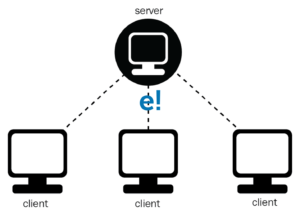
JMeter acts like a group of users sending requests to a target server. It collects response from target server and other statistics which show the performance of the application or server via graphs or tables.
Regular Expressions are used to search and manipulate text. JMeter is used for interpreting forms of regular expression or patterns being used throughout a JMeter test plan.
The protocols supported by JMeter are:
A Test Plan provides a layout of the web application as well as the client-server application. It can be viewed as a container for running tests. A complete test plan will consist of one or more elements such as thread groups, logic controllers, sample-generating controllers, listeners, timers, assertions, and configuration elements. A test plan must have at least one thread group.
Samplers – Sampler generates one or more sample results. These sample results have many attributes like elapsed time, data size, etc. It allows JMeter to send specific types of requests to the server, through samplers, thread group decides which type of request it need to make. Some of the useful samplers are HTTP request, FTP request, JDBC request etc.
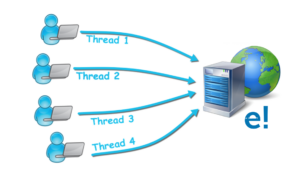 Thread Groups – JMeter is the beginning part of thread group elements. It is an important element of JMeter, where you can set number of users and time to load all the users given in the thread group.
Thread Groups – JMeter is the beginning part of thread group elements. It is an important element of JMeter, where you can set number of users and time to load all the users given in the thread group.
The two types of JMeter are:

A pre-processor is something that will happen before sampler executes. To configure the sample request prior to its execution or to update variables that are not extracted from response text pre-processor elements are used.
Some of the pre-processor elements include:
A JMeter thread by default will send requests continuously without any pause. Timers are used to get a pause between the request.
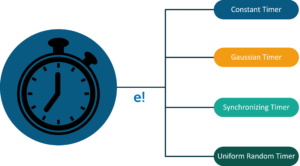
The different types of Timer in JMeter are:
Test fragment is a type of element like Thread Group element. The only difference is test fragment is not implemented unless it is referenced by either a Module controller or an Include controller.
Assertion helps to verify that your server under test returns the expected results.
The Types of Assertion include:
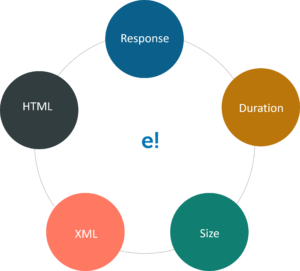
The execution order of Test Elements is in the following sequence:
Configuration Elements help you to create defaults and variables to be used by Samplers. They are also used to add or modify requests made by Samplers. These elements are executed at the start of the scope of which they are part. Therefore, a Configuration Element is accessed only from inside the branch where it is placed.
To reduce the resource requirements in JMeter:
You can ensure re-usability in the following ways:
By synchronizing, timer JMeter spike testing can be achieved. Synchronizing timer, blocks thread until a specific amount of threads has been blocked and then release them all together thus creating large instantaneous load.
Some of the JMeter Listeners are:
 You can capture script by recording in the following manner:
You can capture script by recording in the following manner:
The two types of Controllers in JMeter are:

Pre-processor – A Pre-Processor is something that will happen before a sampler executes. They are often used to modify the settings of a Sample Request just before it runs.
Post-processor – A Post-Processor executes after a sampler finishes its execution. This element is most often used to process the response data.
Some of the uses of Monitor Test are:
Some of the benefits provided by JMeter for Performance Testing are:

Distributed load testing is the process through which numerous systems can be used for simulating a load of a large number of users. JMeter can do distribute load testing with the help of master-slave configuration.
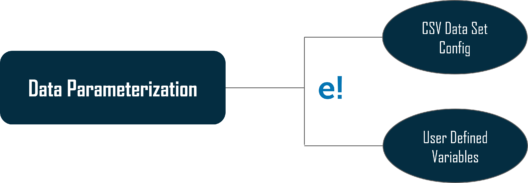
Data Parameterization makes the scripts reusable where the values need not be hardcoded for the same request with different parameters.
| JMeter | LoadRunner |
|
|
The important plugins supported in JMeter are:
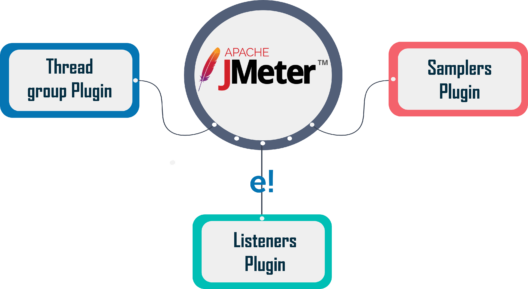
| JMeter | SoapUI |
|
|
Workbench is a storage area for adding some components which can be added to test plan if required. Components of workbench do not get saved with the test plan automatically. They have to be saved separately as test fragments.
You can eliminate all embedded resources from being explicitly called. Requests have a checkbox at the bottom named as “retrieve embedded resources.” It would grab all CSS, JPG, etc. It is a brilliant way to find resources and broken link in a web App.
In the regular expression, Contains indicates that the regular expression matched at least some part of the target. While Matches means the regular expression matched the whole target. So, ‘alphabet’ is “matched” by ‘al.*t.’
With this, we have come to the end of JMeter interview questions article. I Hope these JMeter Interview Questions will help you in your interviews. In case you have attended any interviews in the recent past, do paste those interview questions in the comments section and we’ll answer them.
Also, check out the Performance Testing Certification Training by Edureka, a trusted online learning company with a network of more than 250,000 satisfied learners spread across the globe. This course provides you insights into software behavior during workload. In this course, you will learn how to check the response time and latency of software and test if a software package is efficient for scaling. The course will help you check the strength and analyze the overall performance of an application under different load types.
 Thank you for registering Join Edureka Meetup community for 100+ Free Webinars each month JOIN MEETUP GROUP
Thank you for registering Join Edureka Meetup community for 100+ Free Webinars each month JOIN MEETUP GROUPedureka.co